5. The Big Lebowski
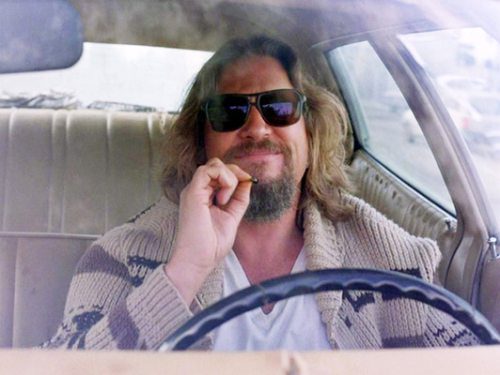
Who said stoner comedies couldn’t be cool? Well, maybe not Eastwood-in-a-poncho cool, that’s for sure. But who needs a poncho when you have The Dude, arguably cinema’s most laid back character ever, casually strutting a bath robe while sipping some White Russians at the backseat of a limo?
The Big Lebowski is a film that defies expectations. It feels so random and bizarre with its inclusions of hired goons, nihilist musicians, conceptual artists, rich philanthropists with kidnapped wives and unnecessarily crass and aggressive Latino bowlers that it almost feels overstuffed.
Almost, because the Coen brothers are masters of their craft. They set out to write a sort of Raymond Chandler like mystery, with a complex plot that is ultimately unimportant given that the titular Lebowski is too suave and relaxed to even keep track of all his discoveries.
At the same time, you get Walter Sobchak – Lebowski’s best friend -, a hot-headed veteran with a penchant for gratuitous violence who is constantly messing everything up in Lebowski’s life, if not putting him in deeper trouble. And let’s not mention other iconic characters, like the 100% passive Donny, or the hilarious foul-mouthed Jesus (who steals every single scene he’s in).
What The Big Lebowski really excels in is placing the audience in its protagonist’s feet. At the start of the movie, The Dude is living such an idyllic laid back life that you kind of feel bad when his no-prospects-whatsoever peaceful existence is disrupted.
As the story progresses, and becomes increasingly hard to catch up with, the audience has no choice but to follow along in an almost dazed state, exactly how Lebowski goes through life without a care in the world. In this quest, the incredible roster of unique characters comes and goes in an entrancing manner, and all the iconic quotes just beautifully stick to the brain.
Don’t feel surprised if by the end of it you feel utterly confused but also in the mood for laying back and listening to The Eagles all night long.
4. Le Samourai
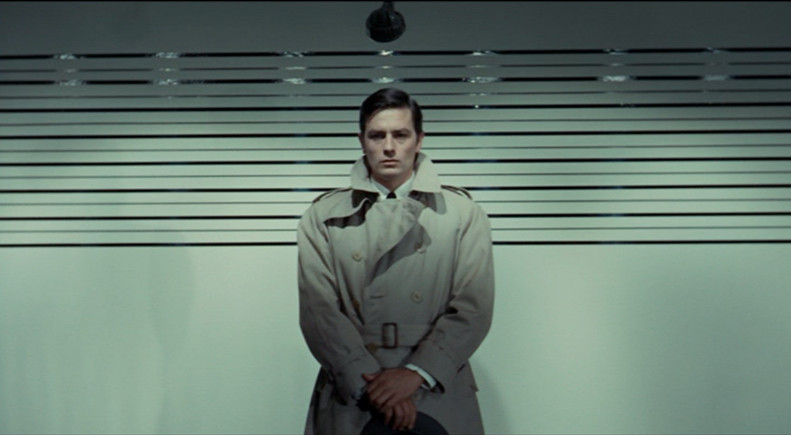
The brooding mysterious antihero is one of the many classic staples people usually associate with the concept of “cool”. All one basically has to do is put a hat and trench coat on one’s actor, have him be constantly encircled by thick smoke, give him a morally ambiguous nature and have him walk the dim-lighted, shadow-filled streets of some iconic European or American city and you got yourself a badass protagonist. And for that you have Jean-Pierre Melville’s Le Samouraï to thank.
Released in 1970 to immediate acclaim and notorious cult status, Le Samourai has remained deeply ingrained in the holy hall of cool movies due to its flawless style and command over mood and visuals.
While it does take advantage of some rather overutilized visual flourishes from the 70’s – such as zoom shots, to name one -, Le Samourai is smart enough to spin the dice to its own accord, crafting a movie that’s engaging and exciting to look at. With its inspiration on classic noir films and the image of Japanese samurais, Melville’s masterpiece remains dazzling to this day.
But none can talk about Le Samourai without mentioning Alain Delon’s Jef Costello. An ominously poker-faced and dapperly dressed gun-for-hire, Costello’s pose and calm remain steady throughout the entire film. Be it while he’s at home with his bird or being chased through the Parisian subway station, Costello never breaks a sweat under any sort of pressure.
As he navigates what must probably be some of the most stylish and well decorated sets and nightclubs in film history, Delon uses his striking good looks and suave walk to blend into the crowd, further facilitating his assassination attempts.
Cool and moody, Le Samourai’s cult status is felt and garnered from the opening shot right down to its iconic final confrontation.
3. Fight Club
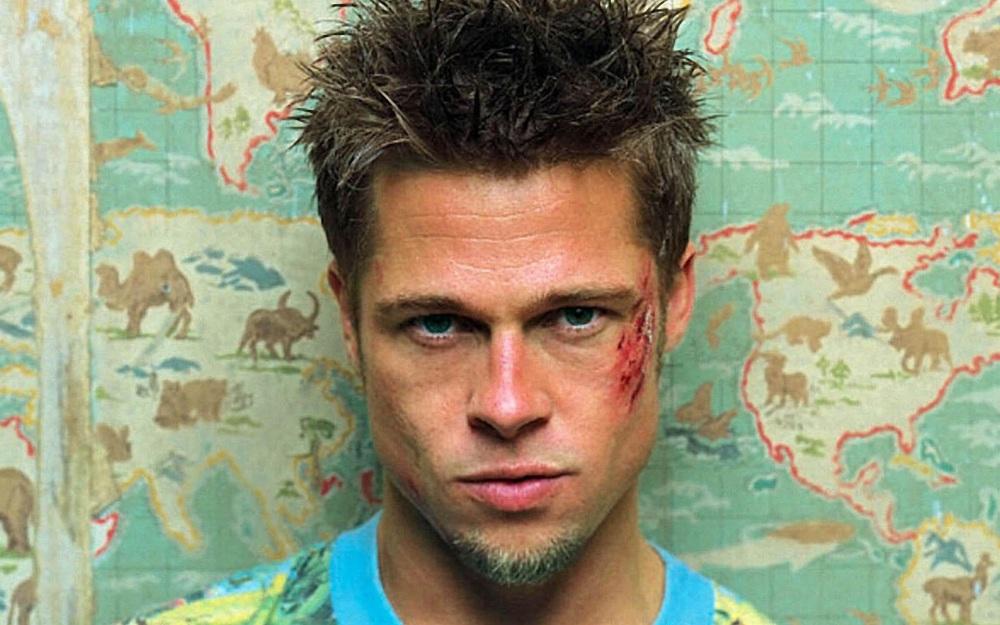
You’re probably thinking this list has fallen into a succession of clichés right now. I mean, Fight Club? The obvious choice for a cool film, as it is probably one of the most toxically masculine movies ever brought to the big screen? Well, as long as there’s a lean shirtless Brad Pitt beating the piss out of other men while enlisting them for terrorist attacks against the capitalist void of contemporary life, you betcha.
Fight Club is iconic for many reasons. First of all, David Fincher is able to enhance and improve any movie he gets his grubby little hands on, what with his air tight visual and aesthetical choices and precise actor direction. Second, it introduced one of the coolest and most influential male characters in cinematic history, Tyler Durden.
Third, it has an incredibly interesting story with several turns and surprises, not to mention it boosts one of the biggest plot twists in recent memory. Last but not least, it’s hyper violent and surprisingly meditative about the state of the world back in the days of 1999.
Like Pulp Fiction a mere five years before, Fight Club is a film that perfectly encapsulates a generation, or the way a generation feels about itself and the reality surrounding it.
It is a movie led by a cool, handsome, masculine man on a radical journey to rid western society from anything – ideas, thoughts and habits – that deprives him from such masculinity and from own his sense of self. Only it is told in such an engrossing and schizophrenic manner that it leaves the audience constantly entranced and asking the right questions.
No matter what you think of Fight Club, you have to agree you could never rock a red leather jacket like Tyler Durden does.
2. Léon: The Professional
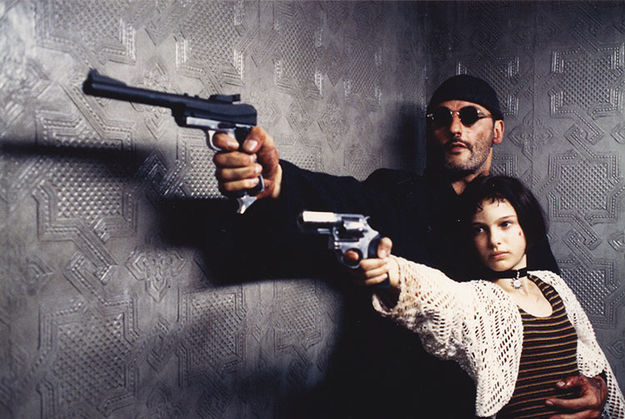
Léon: The Professional is the rare type of movie that manages to move in two different directions at all times. It is increasingly (and concurrently) calm and explosive. It amps up the tempo for tension and action while it slows down for character development at the same time. And, most impressively, it is the one-of-its-kind film that gets to be really damn cool and unexpectedly heartbreaking all at once.
Jean Reno plays Léon, a brooding silent hitman who – much akin to Alain Delon in Le Samourai – lives a quiet lonesome life in New York. The moroseness of his routine is only ever interrupted by the jobs he has to pull off, all which he sees through in a calm, thorough manner. However, everything drastically changes when a corrupt cop kills the family living next door to him, except for young Mathilda, who escapes and begs to be taken in by Léon. From that moment on, a mentor-friend like relationship begins to blossom between the two protagonists, all the while Mathilda seeks vengeance for her family.
Children are hardly ever cool in a film. When they’re insufferable, they get to be – at the rarest occasions – fun and charismatic. Léon’s Mathilda, however, is the exception to break all exceptions. At once combining the murderous rage of a young Nikita, the boisterous joy of a child and even sparks of omitted sexuality, Mathilda is one of the most memorable child characters in any film ever.
As you watch her take hold of a Magnum the size of her head and shoot out the window, with the barrel aimed towards the street, the only thought that will be going through your head is “damn, this girl is a serious badass.”
But of course, Mathilda can’t be the most remarkable thing in a movie called Léon: The Professional. Jean Reno absolutely kills it in this role, as he invokes the image of a lonely man who wishes he had had a better life, who wishes he had gone to school and learnt how to read. It is a heartbreaking portrayal of a cool and thorough whose existence is surrounded by violence. Also, Léon has none other than Gary Oldman in what is arguably his most deliciously demented and explosive performance as the main antagonist, Stansfield.
After watching Léon: The Professional, you’ll be sure to make EVERYONE watch it as well.
1. Get Carter
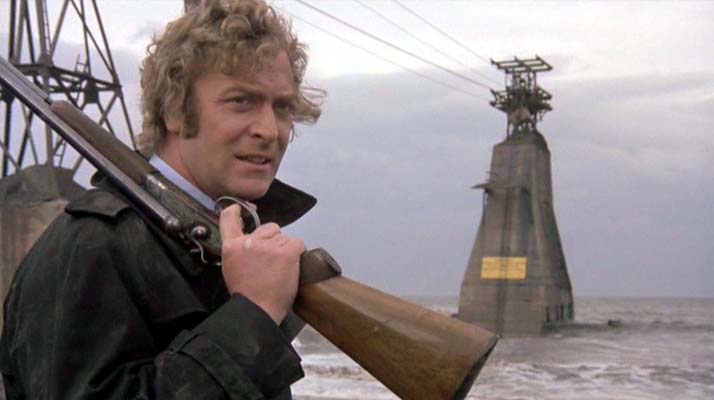
There is a remarkable difference between British and American crime films. While the latter are often more stylized and exaggerated in their depictions of violence, the former tend to be grittier and more realistic.
Granted, the Brits have granted us with hyper stylized movies like Lock, Stock and Two Smoking Barrels but to every one of those there are at least three This is England or Sexy Beast. But just because a movie is colder and grittier, it doesn’t necessarily make it any less cool or enjoyable, and Mike Hodge’s Get Carter is the perfect proof.
Adapted from Ted Lewis “Jack’s Return Home”, and featuring Michael Caine in one of his most iconic roles, Get Carter maintained an expressive fan base despite only reaching home video in 1993, a whopping twenty years after its release.
Championed by influential filmmaker such as Quentin Tarantino and Steven Soderbergh, Get Carter’s reputation as a cult classic has only grown as the years went by, as did its overall critical reception. The film is now considered by many as one of the best British films of all time.
The story centers around Jack Carter, a London mobster, who goes back to him hometown to investigate the mysterious death of his brother. As his suspicions of foul-play are slowly confirmed, Carter begins to exact his ruthless revenge, leaving a trail of bodies on his wake.
What makes Carter so memorable is the absolutely cold and calculating manner with which he goes about his vengeance. Not once is there a shred of regret or an ounce of remorse in his face. To him, the act of killing seems an everyday action, which he performs in the fastest, most efficient way possible. There is no need to throw thirty punches at someone when two will do the job.
That exact recollected nature of its protagonist is what grants Get Carter an undeniable staple of a cool movie. There is something incredibly arresting about watching Caine as almost a real-life gangster in real life England. Caine actually took inspiration from legitimate gangsters he was acquainted with in his youth to build the Jack Carter’s character, and it shows.
Get Carter is the rare kind of movie where the lack of stylization helps in it being cooler and enticing, as it makes the film more believable. It also helps to have Michael Caine beating a man to death with a shotgun. What a sight to behold.
Author Bio: Fernando Pompeu is unashamed to admit he loves Batman and Robin. He just tries to hide that information behind a lot of Bergman and Tarkovsky films. He also has a small production company.